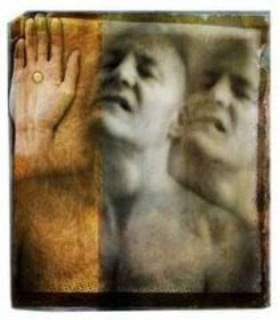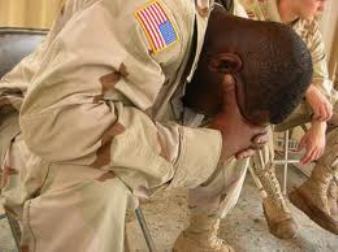by Ed Mattson
I received an email this week regarding the efforts of a Gulf war veteran on behalf of veterans suffering with Post Traumatic Stress Disorder (PTSD), which is characterized by potentially disabling symptoms, that are behavioral and emotional and occur in those individuals exposed to severe psychological trauma such as sexual abuse, combat, or natural disorders. In 1980, PTSD became officially recognize by the American Psychiatric Association, and added to the third edition of its Diagnostic and Statistical Manual of Mental Disorders (DSM-III).

PTSD is a relatively new diagnosis, but it has been with mankind since the first cavemen began beating each other on the head with clubs. All one has to do is watch any documentary of a tragic event and observe the reaction of those who have lived through it. They can hardly get three words in edge-wise before there is a breakdown of emotion. In the movie, “Band of Brothers”, the personal interviews with the heroes who fought in Easy Company, were obviously very stressful for those who survived, and you could see in their demeanor the long-hidden PTSD each man had carried the last six decades. That is PTSD.
A couple of months ago I wrote about PTSD and the problems it has caused for the veterans who live every day with their own demons, fears, and flash backs, and why the transition from warrior to civilian is so difficult. There is no doubt that since 1980, when APA officially recognized PTSD as a mental disorder, the military and Veterans Administration have been doing a much better job of helping those who display the most obvious outwardly signs, but there have been millions of others who have slipped through the cracks because, in most part, the fear of being “labeled” or “tagged” with a “mental disorder”. So many who served in WWII, the Korean War and in Vietnam, have never gotten the help they need, and live every day with the possibility of having a complete breakdown. Most are not even aware of their condition, and seek solace by never allowing themselves to re-visit the event(s) which can trigger less than normal behavior.
Today the VA and military have gone to great lengths to help those who are returning from the multiple missions they have been assigned in combat zones, well before major problems can occur. As it has been explained to me, there are a number of decompressing steps that need to be taken:
- Returning from Warrior mentality to normal military duty
- Re-establishing communication and intimacy with family and friends
- Counseling to understand and recognize how to deal with the potential effects of PTSD
- Reintegrating into the civilian environment
- Making the decision to re-enlist or transition to civilian status
- Preparing for civilian life and employment if civilian transition is the choice
- Regaining normalcy in “the real world”.
Each branch of the service provides a number of mandatory counseling and informational programs as well as an array of training programs that can help deal with the ever-present possibility that some will never achieve 100% normalcy because with war “you never get over it but you learn to live with it. It’s part of who you are but you don’t dwell on it. If you dwelled on it you’d be paralyzed by it”. (Greg Marinovich, war correspondent).
In addition to the “unwinding therapy” provided by the military and follow-up by the VA, many counseling support choices are available through the non-profit sector, including faith-based groups, ex-military support agencies, state sponsored solutions, and individual groups of PTSD victims learning to cope by helping others facing the same battle. I have mentioned several such groups in past articles, but this last week I was introduced to Antoine Johnson M.A. ED. SPEC., President of the Warrior Relaxation Response Center in Colorado Springs CO, who after serving a couple of combat tours and retiring from the army, transitioned to civilian life to pursue a teaching career.
Since leaving the military Antoine knew his role in life was to help those in need. It started in the Colorado Springs School District where he learned how to educated troubled students who were on the verge of giving up on life. As Antoine puts it, “This was my basic training for what I do today… working with the hardest kids society can offer up”. His first months of work after leaving the army as a combat platoon sergeant, were the most difficult part of his transition to civilian life, and was made even harder by having to educate kids who just couldn’t care less, compared to directing troops, where duties were carried out without much hesitancy. This is not to complain, but having to become mentor, hero, father, and friend to help his students gain respect for themselves and for life, became essential for his role at the Warrior Relaxation Response Center.
After a brief tenure in his teaching profession, Mr. Johnson read about his fellow warriors who were undergoing the same transitioning challenges he had faced with many never quite reaching a point of fully understanding their affliction with PTSD. He knew he must be there to help as many as possible achieve the level of metal freedom that can only come about with the right kind of help. The need to serve, as it was to volunteer to serve his country, again became a calling greater than the need for personal success as a teacher, and as satisfying as it was in his position to help wayward bound children get back in step with society, he knew he had to answer this new call.
So began Antoine’s one-man campaign in May of 2009, to develop a facility where ex-soldiers could come for help to identify and understand the serious emotional and behavior disorders he himself had to deal with. There were no start-up grants to fund Mr. Johnson’s program, no major donors, only a goal to develop a program he himself had followed and one which offers a lasting cure to PTSD.
Modeled after the therapy concepts of Harvard cardiologist, Dr. Herbert Benson, Antoine created the Warrior Relaxation Response Center using multiple discipline concepts to overcome the many symptoms of PTSD so that life can become a center of normalcy. This was not simply a class-room type instructional program, but a program to “deprogram the hard-wired” antidote of fight or flight reaction in response to stressful situations that were the key elements of survival in combat.
The concept of relaxation as being the key to overcoming a learned stress reaction like fight or flight requires many elements that must be re-learned. To those with no experience in the field that may seem pretty simple, but in fact is one of the most difficult mental tasks that one must accomplish. Because post traumatic stress disorder creates both physical and mental responses dealing with the anatomical and physiological functions for the entire body (structure of all living things) all the way down the cellular/genetic level, the entire being needs to be addressed which is impossible without total relaxation.
The Relaxation Response Center teaches decreasing metabolism, heart rate, blood pressure, and the rate of breathing, to calm brain activity much in line with meditation techniques used in other therapy procedures. The purpose of the program is to automatically elicit or bring-out a response in participants that will bring peace and calm, which have been shown to elicit changes in gene activity, and can totally eliminate stress. Like the initially learned response to combat was the fight or flight phenomenon, caused by an increase in adrenaline, the object to relaxation therapy, is to train the body to basically redirect attention and decision-making functions of the brain, so it can respond rationally to the degree of stress that needs to be addressed.
The program developed by Mr. Johnson is not a “cheap, one-night stand”, but rather a complete re-learning process with an outstanding record of success. It does take time to un-learn and then re-learn behavioral patterns, but for a soldier wanting to put the past behind, it is well-worth the effort and time.
The road to satisfying the criteria for TRI-CARE coverage has been one of the major hurdles to leap, but with the addition of two part-time licensed behavioral specialists Antoine’s center now meets the requirements for coverage, and the center joined its network on July 1. It means Fort Carson health providers now can refer soldiers to the center for behavioral health treatment, and an opportunity for continuing this remarkable program.
If the readers of this column would like more information or would like to help The Warrior Relaxation Response Center, please visit his website at www.warriorrrc.org where you can read about his unique program and make a contribution to the cause. Donations are tax deductible and helping out veteran brothers is a worthy cause. You can also contact Antoine at 719.339-6313 office, 719.640-8158 cell for more details.

Following his service in the Marine Corps Ed Mattson built a diverse career in business in both sales/marketing and management. He is a medical research specialist and published author. His latest book is Down on Main Street: Searching for American Exceptionalism
Ed is currently Development Director of the National Guard Bureau of International Affairs-State Partnership Program, Fundraising Coordinator for the Warrior2Citizen Project, and Managing Partner of Center-Point Consultants in North Carolina.
Mr. Mattson is a noted speaker and has addressed more than 3000 audiences in 42 states and 5 foreign countries. He has been awarded the Order of the Sword by American Cancer Society, is a Rotarian Paul Harris Fellow and appeared on more than 15 radio and television talk-shows.
ATTENTION READERS
We See The World From All Sides and Want YOU To Be Fully InformedIn fact, intentional disinformation is a disgraceful scourge in media today. So to assuage any possible errant incorrect information posted herein, we strongly encourage you to seek corroboration from other non-VT sources before forming an educated opinion.
About VT - Policies & Disclosures - Comment Policy




